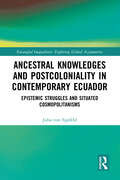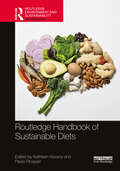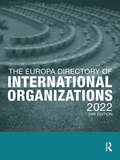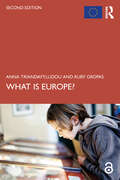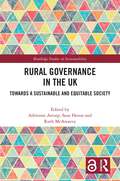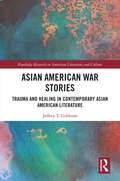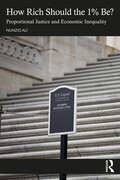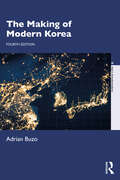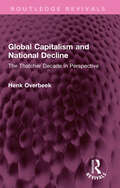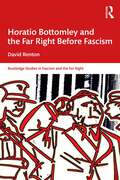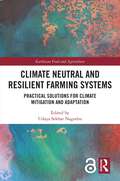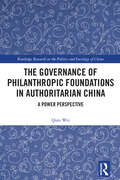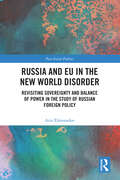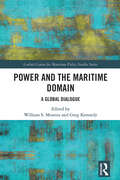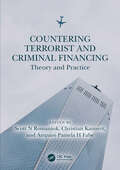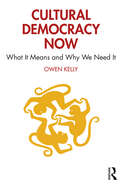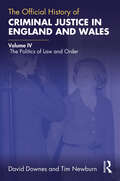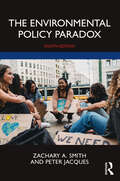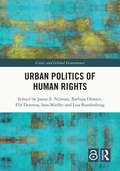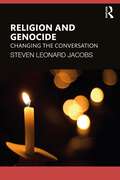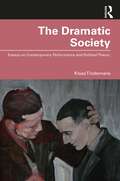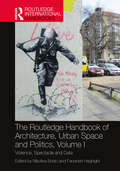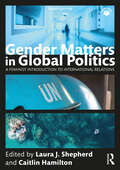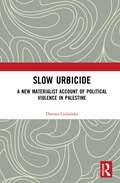- Table View
- List View
Ancestral Knowledges and Postcoloniality in Contemporary Ecuador: Epistemic Struggles and Situated Cosmopolitanisms (Entangled Inequalities: Exploring Global Asymmetries)
by Julia von SigsfeldIn light of an unprecedented constitutional acknowledgement of diverse epistemologies and stipulation making the protection and advancement of so-called 'ancestral knowledges' a duty of the state, this research provides an analysis of the uptake of historically subalternized knowledges by the state during the government of Rafael Correa (2007-2017), as well as of the strive for epistemic justice by peoples and nationalities organizations' in the context of struggles for social change, decolonization, and self-determination. On the basis of rich empirical material, the analysis traces state discourses and practices and mechanisms to govern 'ancestral knowledges' in the framework of the government's Knowledge Society project and delineates how leaders of peoples and nationalities' organizations struggle for the decolonization of knowledge. This monograph will be of interest to those concerned with relations between peoples and nationalities and Latin American states, politics of recognition and collective rights, the workings of purportedly post-neoliberal governments and the possibilities and limits for alternatives to development, the struggle of peoples and nationalities' organizations for (epistemic) decolonization, as well as ongoing (re-)conceptualisations of cosmopolitanisms against restructurations of the coloniality of knowledge and being.
Routledge Handbook of Sustainable Diets (Routledge Environment and Sustainability Handbooks)
by Kathleen Kevany and Paolo ProsperiThis handbook presents a must-read, comprehensive and state of the art overview of sustainable diets, an issue critical to the environment and the health and well-being of society. Sustainable diets seek to minimise and mitigate the significant negative impact food production has on the environment. Simultaneously they aim to address worrying health trends in food consumption through the promotion of healthy diets that reduce premature disability, disease and death. Within the Routledge Handbook of Sustainable Diets, creative, compassionate, critical, and collaborative solutions are called for across nations, across disciplines and sectors. In order to address these wide-ranging issues the volume is split into sections dealing with environmental strategies, health and well-being, education and public engagement, social policies and food environments, transformations and food movements, economics and trade, design and measurement mechanisms and food sovereignty. Comprising of contributions from up and coming and established academics, the handbook provides a global, multi-disciplinary assessment of sustainable diets, drawing on case studies from regions across the world. The handbook concludes with a call to action, which provides readers with a comprehensive map of strategies that could dramatically increase sustainability and help to reverse global warming, diet related non-communicable diseases, and oppression and racism. This decisive collection is essential reading for students, researchers, practitioners, and policymakers concerned with promoting sustainable diets and thus establishing a sustainable food system to ensure access to healthy and nutritious food for all.
The Europa Directory of International Organizations 2022
by Helen CantonThe Europa Directory of International Organizations 2022 serves as an unequalled one-volume guide to the contemporary international system. Within a clear, unique framework the recent activities of all major international organizations are described in detail. Given alongside extensive background information the reader is able to assess the role and evolving functions of these organizations in today's world. The contact details, key personnel and activities of more than 2,000 international and regional entities have again been thoroughly researched and updated for this 24th edition. Highlights in this edition include: - a fully revised Who's Who section with biographical details of the key players in the international system. - the response of the international community to crises and conflicts throughout the world. - specially-commissioned introductory essays cover topics including global environmental governance, transboundary water management, and multilateral governance and global action on health.
What is Europe?
by Anna Triandafyllidou Ruby GropasThis authoritative yet accessible introduction to understanding Europe today moves beyond accounts of European integration to provide a wide-ranging and nuanced study of contemporary Europe and its historical development. This fully updated edition adds material on recent developments, such as Brexit and the migrant and Eurozone crises. The concept of Europe is instilled with a plethora of social, cultural, economic, and political meanings. Throughout history, and still today, scholars writing on Europe, and politicians involved in national or European politics, often disagree on the geographic limits of this space and the defining elements of Europe. Europe is, therefore, first and foremost a concept that takes different shapes and meanings depending on the realm of life on which it is applied and on the historical period under investigation. At a given point in time, depending on the perspective we adopt and the situation in which we find ourselves, Europe may represent very different things. Thus, we should better talk about ‘Europes’ in plural. What is Europe? explores these evolving conceptions of Europe from antiquity to the present. This book is all the more timely as Europe responds to the Russian invasion of Ukraine and Britain’s departure from the European Union, financial slump, refugee emergencies, and the COVID-19 pandemic. This book offers a fully updated introduction to European studies from an interdisciplinary perspective. It is a crucial companion to any undergraduate or graduate course on Europe and the European Union. The Open Access version of this book, available at www.taylorfrancis.com, has been made available under a Creative Commons Attribution-Non Commercial-No Derivatives 4.0 license.
Rural Governance in the UK: Towards a Sustainable and Equitable Society (Routledge Studies in Sustainability)
by Sean Heron Ruth McAreavey Adrienne AttorpThis book provides a multidisciplinary analysis of rural society in a post-Brexit UK by examining the emergence of new environmental and rural policies and the implications of this transition for rural communities. Through the Common Agricultural Policy, Common Fisheries Policy, the Birds and Habitats Directives, the Water Framework Directive and a myriad of other legislations and institutions, the EU has had a deciding role in how the UK’s rural environment is governed. Disentangling this policy legacy is a complex process and offers both opportunities and challenges for policy makers, institutions, organisations and stakeholders across the UK as they strive to create appropriate new governance structures. With the Agriculture Bill, the 25-Year Environment Plan and the founding of the Office of Environmental Protection, the UK government has provided at least a degree of clarity on the future direction of environmental governance, but much remains uncertain, not least how this is engaged with by different stakeholders. While Brexit is the lens through which rural policy and sustainability are interrogated, this collection demonstrates the underpinning features of rural policy and society, identifying opportunities for addressing deep-seated policy weaknesses thereby creating a more sustainable and equitable rural society. This book brings together academics, established and early career, to discuss the impact of Brexit on rural environmental governance and on the wider sustainability of rural society, relating to three overall themes: rural governance, sustainable land use, and sustainable rural communities. In doing so, it considers sectors beyond agriculture, paying attention to social relations, community infrastructure, the environment, rural development and broader issues of land use. This book will be of interest to students and scholars of rural development, rural entrepreneurship, rural digital inclusion, environmental policy, sustainable development, land use, agrarian studies and environmental geography.
Asian American War Stories: Trauma and Healing in Contemporary Asian American Literature (Routledge Research in American Literature and Culture)
by Jeffrey Tyler GibbonsAsian American War Stories examines contemporary Asian American literature that considers both the short-term and the long-term effects of war, trauma, and displacement on civilians, as well as the ways that individuals seek healing in the face of suffering. Through the works of contemporary writers like Chang-rae Lee, Ocean Vuong, Nora Okja Keller, Julie Otsuka, Lan Cao, and Lawson Inada, this book explores the ways that recent Asian American literature reflects the enduring consequences of America’s wars in Asia at the individual and collective levels. The book also considers the journeys that individuals take as they pursue healing of their traumatic wounds.
How Rich Should the 1% Be?: Proportional Justice and Economic Inequality
by Nunzio AlìHow rich should the 1% be? And, most importantly, when does the distance in economic resources between the richest citizens and ‘us’, the average citizenry, become a concern for justice? This volume explores how excessive economic inequality gives the best-off considerably more political influence than average citizens, thereby violating political equality. It argues that the gap between the best-off and the worst-off should not be reduced because it is good, but rather as an inescapable instrument to protect citizens from the risk of material domination. For this reason, it defends the ‘principle of proportionality’: economic inequality should not exceed a certain range or proportion to enable both the best-off and the worst-off to be co-authors of the legal, political, and socioeconomic rules that govern the ‘social’ relations in which they are involved. Further, the book discusses material domination and explains how money influences politics and what are the remedies for this phenomenon; how social justice should face and harmonise power, poverty, efficiency, individual merit, and economic liberties; and, most importantly, how to determine income and wealth limit ratios in a liberal democracy. A thoughtful investigation on the interdependencies of money and justice and their influence our socio-political systems, this volume will be of great interest to students and researchers of political theory, political philosophy, economics and development, economics theory and philosophy, and social policy.
The Making of Modern Korea (Asia's Transformations)
by Adrian BuzoThis fully updated fourth edition of The Making of Modern Korea provides a thorough, balanced, and engaging history of Korea from 1876 to the present day. The text is unique in analysing domestic developments in the two Koreas in the wider context of regional and international affairs. Key features of the book include: comprehensive coverage of modern Korean history since 1876 expanded coverage of social and cultural affairs up-to-date analysis of contemporary North Korea, including assessments of the Kim Jong Un administration and development of its nuclear weapons programme a detailed chronology and suggestions for further reading The Making of Modern Korea is a valuable one-volume resource for students of modern Korean history, international politics, and Asian Studies.
Global Capitalism and National Decline: The Thatcher Decade in Perspective (Routledge Revivals)
by Henk OverbeekFirst published in 1990, Global Capitalism and National Decline is a major contribution to the study of British political and economic decline. The author concentrates on the global nature of capitalism as the context for the development of national capitalism, and on the relationship between internal and external factors. A long-term view of British politics enables him to demonstrate that competing popular explanations of Britain’s crisis and the rise of Thatcherism in response to it, are in fact interconnected. The long decline of Britain originating in the 19th century, the inherent weakness of the post-1945 settlement, and the critical events of 1970s, acquire their fullest meaning when seen as different ‘layers’ of one and the same historical process. Henk Overbeek takes the story of Britain’s decline through to Margaret Thatcher’s tenth anniversary in office. His book will be invaluable to scholars and students of economics, politics, and history. it offers a clear perspective on the problems of national decline within a global context, and on Britain’s position in Europe and in the wider world.
Horatio Bottomley and the Far Right Before Fascism (Routledge Studies in Fascism and the Far Right)
by David RentonHoratio Bottomley and the Far Right Before Fascism examines Bottomley’s life and politics, and what made him one of the great figures of Edwardian life. During the first World War, his magazine John Bull sold two million copies a week. Bottomley addressed huge crowds urging them to wage a way of extermination against ordinary Germans. The first chairman of the Financial Times, the inspiration for Toad in The Wind in the Willows, Bottomley was also a major figure in post-1918 politics, urging Conservative voters to dump their leaders and try something new. This carefully researched biography, the first new life of Bottomley for 50 years, shows how he began on the centre-left of Edwardian politics and then moved to the margins, becoming a leading figure on the Edwardian far right, and pre-empting the non-fascist far right of our own days. This book will appeal to scholars and students with interests in political history, fascism and the far right.
Climate Neutral and Resilient Farming Systems: Practical Solutions for Climate Mitigation and Adaptation (Earthscan Food and Agriculture)
by Udaya Sekhar NagothuThis book presents evidence-based research on climate-neutral and resilient farming systems and further to provide innovative and practical solutions for reducing greenhouse gas emissions and mitigating the impact of climate change. Intensive farming systems are a significant source of greenhouse gas emissions, thereby contributing to global warming and the acceleration of climate change. As paddy rice farming is one of the largest contributors, and most environmentally damaging farming systems, this will be a particular focus of the book. The mitigation of greenhouse gas emissions needs to be urgently addressed to achieve the 2 degrees Celsius target adopted by COP21 and the 2015 Paris Agreement, but this is not possible if local and national level innovations are not accompanied by international level cooperation, mutual learning and sharing of knowledge and technologies. This book, therefore, brings together international collaborative research on climate-neutral and resilient farming systems compiled by leading scientists and experts from Europe, Asia and Africa. The chapters present evidence-based research and innovative solutions that can be applied or upscaled in different farming systems and regions across the world. Chapters present models and technologies that can be used for practical implementation at the systemic level and advance state of the art knowledge on carbon neutral farming. Combining theory and practice, this interdisciplinary book provides guidance which can inform and increase cooperation between researchers from various countries on climate-neutral and resilient farming systems. Most importantly, the volume provides recommendations which can be put into practice by those working in the agricultural industry, especially in developing countries, where they are attempting to promote climate-neutral and resilient farming systems. The book will be of great interest to students and academics of sustainable agriculture, food security, climate mitigation and sustainable development, in addition to policymakers and practitioners working in these areas.
The Governance of Philanthropic Foundations in Authoritarian China: A Power Perspective (Routledge Research on the Politics and Sociology of China)
by Qian WeiThis book is the first monograph to provide a multilevel analysis of power dynamics underlying the governance of philanthropic foundations in the authoritarian context of China. As a special kind of organization with a democratic culture, Chinese foundations’ governance is under more pressure than we realize. The government has been evolving its methods to impose stringent control over foundations (Chapter 3) and “purer” foundations highly dependent on individual donations are more likely to adopt authoritarian leadership styles rather than being mechanisms spreading democratic values in Chinese society (Chapter 4). However, this practice does not come without a price. Given power’s double-edge of both enabling and constraining effects, although strongman leaders may use their power to get things done, their power may also cause the problem of accountability (Chapter 5). Overall, Chinese society is a stable system with authoritarian power modes. This system is not static but in constant flux, homogenizing incompatible parts until all units of the system adopt the same power mode. This book establishes a comprehensive and bleak picture of the unfavorable conditions foundations in China face and provides valuable insights to understand the future of the nonprofit sector in China. This book will be of interest to students and researchers in the fields of sociology, political science, and nonprofit studies (NGO management). It will also be a valuable resource for NGP practitioners.
Russia and EU in the New World Disorder: Revisiting Sovereignty and Balance of Power in the study of Russian Foreign Policy (Post-Soviet Politics)
by Aziz ElmuradovThis book makes an original contribution to Russia-EU literature by analyzing constructions and trans-formations of the Russian ‘Self’ in relation to the European "Other". It provides an orientation towards understanding Russian foreign policy discourse under Putin and offers a thorough analysis of the actions of key policy actors to ground the Russian discourse ideationally, historically, psychologically, and politico-sociologically. Providing a rich analysis of how Russian foreign policy toward the EU evolved from cooperation to competition and ultimately conflict, the author argues that to understand these changes and continuities we must explore concepts of sovereignty and balance of power central to the drafting of Russian foreign policy. Primarily situated in the fields of International Relations and Russian foreign policy, this book will also be of interest to scholars in the fields of Foreign Policy Analysis, Post-Soviet Studies, Eurasian Studies, Historical International Relations, Critical Security Studies, Political Sociology, and Political Psychology.
Power and the Maritime Domain: A Global Dialogue (Corbett Centre for Maritime Policy Studies Series)
by William S. Moreira Greg KennedyThis book offers a multi-disciplinary and multi-national approach to defining key elements required to define power within the maritime domain. The volume engages with the concept that the maritime domain is a multi-dimensional space embracing oceans, seas, waterways, including all elements of maritime power, related activities, infrastructure, resources and assets. It illustrates the complexity and interconnectivity of the factors that contribute to the appreciation, creation, and application of maritime power. In practical terms, the book highlights that the maritime domain is a continuum that interconnects countries, cultures, politics, economics, trade, environment, knowledge, and technological power globally. Perhaps most importantly, the maritime domain generates power of its own volition, as well as acting as a critical enabler for the creation of other types of nations power: economic, political, military, technological, intelligence and fiscal power, in particular. The book not only brings those various factors to the reader’s attention but, in the synthesis, also clarifies the connections between the various elements in creating a greater maritime whole. This book will be of great interest to students of maritime security, strategic studies and International Relations.
Countering Terrorist and Criminal Financing: Theory and Practice
by Scott N Romaniuk, Christian Kaunert, and Amparo Pamela H FabeCountering Terrorist and Criminal Financing provides an up-to-date overview and critical analysis of terrorism financing, focusing on tactics and practical measures directed at preventing money laundering and countering the flow of terrorism funding. In doing so, the book details some of the major doctrines, outlining policies of states and key regional and global partnerships in Europe, Asia, North America, South America, the Middle East, and Africa. Chapters bring together a diverse range of expert scholars and practitioners who specialise in theoretical principles, utilising empirical research and an analysis of the cross-national networks and cross-group collaborations that underpin the illicit activities that fund such groups. The book serves as the most current and comprehensive resource in the area of countering the financing of terrorism and organised crime—incorporating regional and group-specific approaches, challenges, and consequences. This focus encompasses legal measures, social policies, and military operations and security force responses by states and non-state actors to assemble the most up-to-date counter-terrorist financing information into a single volume.
Cultural Democracy Now: What It Means and Why We Need It
by Owen KellyPositioning cultural democracy in a historical context and in a context of adjacent movements such as the creative commons, open source movement, and maker movement, this book goes back to first principles and asks what personhood means in the twenty-first century, what cultural democracy means, why we should want it, and how we can work towards it. In this new book, the author provides a timely untangling of the various historical meanings of the term and explores the various ways in which it has been co-opted, suggesting that it has a strength that we should open up to examination with a view to reinvigorating it. Just as importantly, the book situates cultural democracy within the wider framework of progressive political and social movements, and of the impact of new digital information and communication technologies. To those unfamiliar with the term, it introduces cultural democracy through related concepts such as digital cultural politics, participatory democracy, and digital citizenship. Providing a much-needed theoretical take on the growing interest in cultural democracy, this book will be essential reading for students and scholars interested in the arts as well as practitioners and policy makers. It combines theory and practice with a view to inciting both thought and action.
The Official History of Criminal Justice in England and Wales: Volume IV: The Politics of Law and Order (Government Official History Series)
by David Downes Tim NewburnThis book is Volume IV in the Official History of Criminal Justice in England and Wales. Previous volumes have focused on the moral reforms of the 1960s, the changes to the criminal courts and the introduction of an independent prosecution service, and the broad shifts in penal policy that have taken place in the post-war era. This volume examines the changing politics of law and order, charting the gradual shift toward greater political conflict and dispute. Until the early 1970s law and order rarely occupied a privileged place in political debate. From that point this began to change with, initially, the Conservatives utilising crime and penal policy as a means of distinguishing themselves from their opponents. This volume charts these changes in the politics of law and order and examines the rise in the temperature of political debate around such issues as the Labour Party markedly shifted its direction in the 1990s This book will be of interest to students of British political history, criminology and sociology.
The Environmental Policy Paradox
by Zachary A. Smith Peter JacquesNow in its eighth edition, The Environmental Policy Paradox continues the book's tradition of offering an accessible introduction to the social, economic, legal, and political matters pertaining to environmental policy while also developing the student’s own unique views. The text explains why some environmental ideas shape policy while others do not and illustrates that even when the best short- and long-term solutions to environmental problems are identified, the task of implementing these solutions is often left undone or is completed too late. New to the eighth edition: New topics including environmental social movements and the anti-environmental countermovements, environmental justice, corporate influence in regulatory affairs. Analyzes the growing policy divide between the two parties, and the efforts of both Republicans and Democratic presidents to undo the policies of their predecessor. Updated discussions of environmental justice issues. Includes a range of visual aids in figures and tables to demonstrate trends in the topics covered. A new co-author, Peter Jacques, recognized for his teaching and scholarship in global environmental politics and sustainability. A must-buy for courses in Environmental Policy, Environmental Studies, and Public Policy; and as a supplement for courses in American Government and Public Administration.
Urban Politics of Human Rights (Cities and Global Governance)
by Barbara Oomen Janne E. Nijman Sara Miellet Elif Durmuş Lisa RoodenburgIncreasingly, urban actors invoke human rights to address inequalities, combat privatisation, and underline common aspirations, or to protect vested (private) interests. The potential and the pitfalls of these processes are conditioned by the urban, and deeply political. These urban politics of human rights are at the heart of this book. An international line-up of contributors with long-term engagement in this field shed light on these politics in cities on four continents and eight cities, presenting a wealth of empirical detail and disciplinary theoreticalisation perspectives. They analyse the ‘city society’, the urban actors involved, and the mechanisms of human rights mobilisation. In doing so, they show the commonalities in rights engagement in today’s globalised and often deeply unequal cities characterised by urban law, private capital but also communities that rally around concepts as the ‘right to the city’. Most importantly, the chapters highlight the conditions under which this mobilisation truly contributes to social justice, be it concerning the simple right to presence, cultural rights, accessible housing or – in times of COVID – health care. Urban Politics of Human Rights provides indispensable reading for anyone with a practical or theoretical interest in the complex, deeply political, and at times also truly promising interrelationship between human rights and the urban.
Religion and Genocide: Changing the Conversation
by Steven Leonard JacobsReligion and Genocide: Changing the Conversation is a cutting-edge introduction to the complex and controversial relationship between religion and genocide. This book aims to widen the reader’s understanding of religion and those who practice it, the nexus of religion and violence, and those who legitimate their violence by framing it in religious terms by looking at notions of holy wars, religious wars, and genocide and the practitioners of such. This book delves into our current thinking of ourselves as biological entities, our relationship to genocide, and the impact of geography (including climate change) and diseases on our humanity and our ability to commit genocide. Tying together all these seemingly disparate threads, this text concludes with the significant and still largely unanswered question: "Where do we go from here?". Highlighting the complex relationship between religion and genocide, this is an essential read for students and academics studying religion and violence, Judaism, Judaic studies, and holocaust and genocide studies. Religion and Genocide will also be of interest to researchers in related subjects such as history, politics, sociology, and anthropology.
The Dramatic Society: Essays on Contemporary Performance and Political Theory
by Klaas TindemansAll societies are, by their very nature, dramatic. They present themselves, especially for those who want to look back in time, as a fascinating and confusing whole of theatrical events and constructions. Sometimes the theatre itself succeeds in capturing that fascination and confusion. This book describes the dramatic society in the form of case studies that link politics, history and culture. The Dramatic Society uses selected plays to examine specific moments in history. Its range of subjects are extremely diverse, including Medea as an icon of terrorism, a choreography based upon Shakespeare’s As You Like It, horror movies about the German unification, a truth commission dealing with "human zoos", and the reconstruction of Ai Weiwei’s troubles with the tax authorities. This collection of insightful essays deals with theatrical performances – including happenings, installations and movies – of the past fifty years, with every chapter attempting to link artistic events with politics and political theory, from Hannah Arendt to Slavoj Žižek. This is a revealing assessment of the ways in which drama and politics become intertwined, offering crucial insights for scholars and students of theatre studies, performance studies, contemporary politics and cultural studies.
Building Resilient Energy Systems: Lessons from Japan (Routledge Explorations in Energy Studies)
by Jennifer F. SklarewThis book explores an ongoing puzzle: why don’t catastrophic events, such as oil shocks and nuclear meltdowns, always trigger transitions away from the energy technologies involved? Jennifer F. Sklarew examines how two key factors – shocks and stakeholder relationships - combine to influence energy system transitions, applying a case study of Japan’s trajectory from the time of the 1970s oil crises through the period following the 2011 Fukushima Daiichi nuclear disaster. Examining the role of diverse stakeholders’ resilience priorities, she focuses on how changes in stakeholder cooperation and clout respond to and are affected by these shocks, and how this combination of shocks and relationship changes shapes energy policies and policymaking. From Japan’s narrative, the book derives unique and universal lessons for cooperation on innovation and energy system resilience applicable to communities and nations around the globe, including implications for transitions in the context of the COVID-19 pandemic. The book also places energy system resilience and innovation in the broader context of the food-energy-water-climate nexus. Building Resilient Energy Systems: Lessons from Japan will appeal to all levels of readers with an interest in energy policy, energy technologies and energy transitions: experts and specialists; academics and students; practitioners and policymakers.
The Routledge Handbook of Architecture, Urban Space and Politics, Volume I: Violence, Spectacle and Data (Routledge International Handbooks)
by Nikolina Bobic and Farzaneh HaghighiFor architecture and urban space to have relevance in the 21st Century, we cannot merely reignite the approaches of thought and design that were operative in the last century. This is despite, or because of, the nexus between politics and space often being theorized as a representation or by-product of politics. As a symbol or an effect, the spatial dimension is depoliticized. Consequently, architecture and the urban are halted from fostering any systematic change as they are secondary to the event and therefore incapable of performing any political role. This handbook explores how architecture and urban space can unsettle the unquestioned construct of the spatial politics of governing. Considering both ongoing and unprecedented global problems – from violence and urban warfare, the refugee crisis, borderization, detention camps, terrorist attacks to capitalist urbanization, inequity, social unrest and climate change – this handbook provides a comprehensive and multidisciplinary research focused on the complex nexus of politics, architecture and urban space. Volume I starts by pointing out the need to explore the politics of spatialization to make sense of the operational nature of spatial oppression in contemporary times. The operative and active political reading of space is disseminated through five thematics: Violence and War Machines; Security and Borders; Race, Identity and Ideology; Spectacle and the Screen; and Mapping Landscapes and Big Data. This first volume of the handbook frames cutting-edge contemporary debates and presents studies of actual theories and projects that address spatial politics. This Handbook will be of interest to anyone seeking to meaningfully disrupt the reduction of space to an oppressive or neutral backdrop of political realities.
Gender Matters in Global Politics: A Feminist Introduction to International Relations
by Laura J. Shepherd Caitlin HamiltonGender Matters in Global Politics is a comprehensive textbook for advanced undergraduates studying politics, international relations, development and similar courses. It provides students with an accessible but in-depth account of feminist methodologies, gender theory and feminist approaches to key topics and themes in global politics.This textbook is written by an international line-up of established and emerging scholars from a range of theoretical perspectives, bringing together cutting-edge feminist scholarship in a variety of areas.This fully revised and updated third edition: introduces students to feminist and gender theory and explains the relevance to contemporary global politics; explains the insights of feminist theory for a range of fields of study, including international relations, international political economy and security studies; presents feminist approaches to key contemporary issues such as climate change, digital politics, war and militarism, disability and global health; and features pedagogical tools and resources, including discussion questions, suggestions for further reading and online resources. This text enables students to develop a sophisticated understanding of the work that gender does in policies and practices of global politics.Support material for this book can be found at: www.routledge.com/9780367477608.
Slow Urbicide: A New Materialist Account of Political Violence in Palestine
by Dorota GolańskaThe book presents a new materialist understanding of acts of deliberate destruction of the built environment and, specifically, of the politics of aggressive spatial containment and regularization of urbanity employed within the conflict in Israel/Palestine. Building on recent scholarship on slow violence and urbicidal policies, it discusses the different dimensions of the violence against the urban space, as well as exposes the complex material-semiotic character of the urban territory and of its destruction. By referring to the concepts of “ethno-territoriality” and “the right to the city,” the book aims to generate an enhanced understanding of problems situated at the overlap of urban studies and investigations of state-sponsored violence, focusing specifically on issues related to urban warfare. Adopting a new materialist perspective, the book is a searing examination of political violence in our times. The volume will be of great interest to scholars and researchers of political science, international relations, cultural studies, and urban studies. It will also appeal to NGO professionals and activists across the world.
